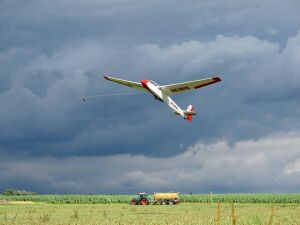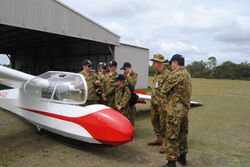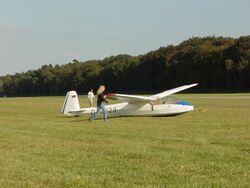Engineering:Schleicher K7
| K7 Rhönadler | |
|---|---|

| |
| Role | Glider |
| National origin | West Germany |
| Manufacturer | Alexander Schleicher GmbH & Co |
| Designer | Rudolf Kaiser |
| Introduction | 1960 |
| Status | Production completed |
| Number built | 550 |
| Developed from | Schleicher Ka-2 |
| Variants | Schleicher ASK 13 |
The Schleicher K7 Rhönadler is a West German high-wing, two-seat, glider that was designed by Rudolf Kaiser and produced by Alexander Schleicher GmbH & Co.[1][2]
Often referred to as the Ka-7 or K-7, the US Federal Aviation Administration type certificate officially designates it as the K7.[1][2][3]
Design and development
The K7 was intended as a two-place trainer with good performance, a rare combination in trainers of its time.[1][2]
The K7 is constructed with a welded steel tube fuselage, covered in doped aircraft fabric covering. The wing is a wooden structure with a doped fabric covering and employs a Goettingen 533 (16%) airfoil at the wing root, transitioning to a Goettingen 533 (14%) section at the wing tip. The wing features powerful dive brakes. The landing gear is a fixed monowheel. The earlier Ka-2 variant has a plywood monocoque fuselage.[1][2][3][4]
After 550 had been built, the K7 was superseded in production by the Schleicher ASK 13.[1][2]
The K7 can be converted into a K7/13 with a conversion kit to lower the wing to the mid-wing position and installation of a one-piece canopy, rendering the aircraft similar to the ASK-13.[1]
Operational history
A K7 was flown to a new world multi-place glider speed record for flight around a 500 km (311 mi) triangle of 84 km/h (52 mph) in 1964 in South Africa .[1][2]

A K7 was assigned to 2 Wing AAFC and used to train Australian Air Force Cadets 228 Squadron at Bundaberg from 2007 to 2014.[5]
Variants
- Ka-2
- Early version with a plywood monocoque fuselage[1][3]
- K7
- Main production version with a steel tube fuselage.[1][2][3]
- K7/13
- K7 converted to a mid-wing arrangement, plus a single piece canopy, to resemble an AS-K 13[1]
Specifications (K7)
Data from Sailplane Directory, Soaring and FAA Type Certificate 7g3,[1][2][3] and The World's Sailplanes:Die Segelflugzeuge der Welt:Les Planeurs du Monde[6]
General characteristics
- Crew: one
- Capacity: one passenger
- Length: 8.15 m (26 ft 9 in)
- Wingspan: 16.0 m (52 ft 6 in)
- Wing area: 17.56 m2 (189.0 sq ft)
- Aspect ratio: 14.6:1
- Airfoil: root: Goettingen 533 (16%), mid: Goettingen 533 (14%), tip: Goettingen 533 (14%)
- Empty weight: 282 kg (622 lb)
- Max takeoff weight: 484.5 kg (1,068 lb)
Performance
- Stall speed: 59 km/h (37 mph, 32 kn)
- Never exceed speed: 200 km/h (120 mph, 110 kn)
- Rough air speed max: 130 km/h (81 mph; 70 kn)
- Aerotow speed: 130 km/h (81 mph; 70 kn)
- Winch launch speed: 100 km/h (62 mph; 54 kn)
- g limits: +4 -2
- Maximum glide ratio: 26:1 at 83 km/h (52 mph)
- Rate of sink: 0.70 m/s (138 ft/min) at 67 km/h (42 mph)
- Wing loading: 27.34 kg/m2 (5.60 lb/sq ft)
See also
Aircraft of comparable role, configuration and era
- Rubik R-26 Góbé
- Scheibe Bergfalke
- SZD-9 Bocian
Related lists
Notes
- ↑ 1.00 1.01 1.02 1.03 1.04 1.05 1.06 1.07 1.08 1.09 1.10 Activate Media (2006). "Ka-7 Schleicher". Archived from the original on 17 November 2011. https://web.archive.org/web/20111117093614/http://www.sailplanedirectory.com/PlaneDetails.cfm?planeID=182. Retrieved 23 July 2011.
- ↑ 2.0 2.1 2.2 2.3 2.4 2.5 2.6 2.7 Said, Bob (November 1983). "1983 Sailplane Directory". Soaring Magazine (Soaring Society of America). USPS 499-920.
- ↑ 3.0 3.1 3.2 3.3 3.4 Federal Aviation Administration (February 1961). "Type Certificate Data Sheet No. 7g3". http://www.airweb.faa.gov/Regulatory_and_Guidance_Library/rgMakeModel.nsf/0/53f76bd8653231df8625748e0055efc5/$FILE/7g3.PDF. Retrieved 23 July 2011.
- ↑ Lednicer, David (2010). "The Incomplete Guide to Airfoil Usage". http://www.ae.illinois.edu/m-selig/ads/aircraft.html. Retrieved 23 July 2011.
- ↑ "Gliding". 1 January 2018. http://www.aafc.org.au/what-we-do/gliding/.
- ↑ Shenstone, B.S.; K.G. Wilkinson; Peter Brooks (1958) (in English, French, German). The World's Sailplanes:Die Segelflugzeuge der Welt:Les Planeurs dans Le Monde (1st ed.). Zurich: Organisation Scientifique et Technique Internationale du Vol a Voile (OSTIV) and Schweizer Aero-Revue. pp. 9–13.
References
- Activate Media (2006). "Ka-7 Schleicher". Archived from the original on 17 November 2011. https://web.archive.org/web/20111117093614/http://www.sailplanedirectory.com/PlaneDetails.cfm?planeID=182. Retrieved 23 July 2011.
- Said, Bob (November 1983). "1983 Sailplane Directory". Soaring Magazine (Soaring Society of America). USPS 499-920.
- Federal Aviation Administration (February 1961). "Type Certificate Data Sheet No. 7g3". http://www.airweb.faa.gov/Regulatory_and_Guidance_Library/rgMakeModel.nsf/0/53f76bd8653231df8625748e0055efc5/$FILE/7g3.PDF. Retrieved 23 July 2011.
- Lednicer, David (2010). "The Incomplete Guide to Airfoil Usage". http://www.ae.illinois.edu/m-selig/ads/aircraft.html. Retrieved 23 July 2011.
- Shenstone, B.S.; K.G. Wilkinson; Peter Brooks (1958) (in English, French, German). The World's Sailplanes:Die Segelflugzeuge der Welt:Les Planeurs dans Le Monde (1st ed.). Zurich: Organisation Scientifique et Technique Internationale du Vol a Voile (OSTIV) and Schweizer Aero-Revue. pp. 81–87.
External links
 |



